Debris remediation, battery storage project among big issues for North Quabbin in 2024
| Published: 01-01-2024 5:06 PM |
Editor’s note: The Greenfield Recorder is beginning to publish stories about what Franklin County residents can likely expect to see happening in their towns in 2024.
ORANGE — The town hopes 16-36 West River St. will rise from the ashes in 2024, two years after an arson that was allegedly started by three youths destroyed the former cereal factory that once stood in that spot.
Thomas Smith, chair of the Orange Selectboard, explained the town is awaiting $3.4 million in state money to remediate the site. Easthampton-based Green Environmental Consulting has been tapped to remove debris and the plastic covering the state Department of Environmental Protection placed over it for the public’s safety. Smith said this work will begin around March, depending on weather.
“That [site] has been a thorn in our side for so long,” he said last week. “That’s one of our biggest projects.”
Three juveniles — with ages ranging from 12 and 14 at the time — were identified two days after the June 4, 2022, fire and face criminal charges in connection with the suspected arson. Due to their ages, their names have been withheld by authorities. The inferno sent embers into the air, with some landing on the vacant former blacksmith shop near 24 East River St. and causing such damage that it had to be demolished. The vacant buildings at 58 and 50 South Main St. also sustained damage.
Selectboard member Jane Peirce, who chaired the board at the time, said 20 fire departments responded to the devastating blaze.
Smith also said he expects upgrades at the town’s wastewater treatment plant will be finished by July. Oscar Rodriguez, who took over for longtime Chief Operator Edward Billiel Jr. in July, said improvements to the more than four-decades-old facility are nearing completion.
According to Rodriguez, new eco-friendly and energy-efficient light fixtures will bring the plant’s electrical system “up to today’s standards” and a new grit management system will remove rocks, debris and sand to help protect the building’s infrastructure. He said he expects in January to receive a switchgear for the new generator that is already in hand.
Article continues after...
Yesterday's Most Read Articles
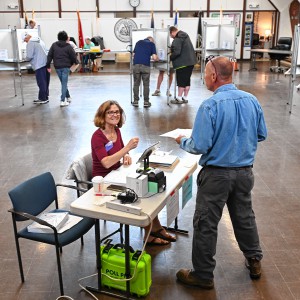 Political newcomer defeats Shores Ness for Deerfield Selectboard seat
Political newcomer defeats Shores Ness for Deerfield Selectboard seat
 South County Senior Center opts not to renew church lease after rift over LGBTQ program
South County Senior Center opts not to renew church lease after rift over LGBTQ program
 More than 130 arrested at pro-Palestinian protest at UMass
More than 130 arrested at pro-Palestinian protest at UMass
 As I See It: Between Israel and Palestine: Which side should we be on, and why?
As I See It: Between Israel and Palestine: Which side should we be on, and why?
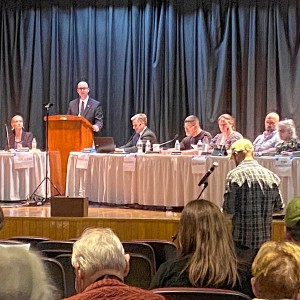 Moratoriums on large-scale solar, battery storage passed in Northfield
Moratoriums on large-scale solar, battery storage passed in Northfield
 Bridge of Flowers in Shelburne Falls to open on plant sale day, May 11
Bridge of Flowers in Shelburne Falls to open on plant sale day, May 11
“That’s the thing that’s kind of holding us up,” he said.
Rodriguez mentioned the generator will keep “everything up and running” if the plant loses power.
About 40% of the $16 million needed to upgrade the facility is being covered by a United States Department of Agriculture grant. In addition, the USDA is loaning the town $10 million for the remainder of the project’s cost.
Billiel previously said wastewater treatment facilities should typically be upgraded every 20 to 25 years. The one in Orange was built in 1977 and received only minor improvements in 2000.
The town could be the site of a David-versus-Goliath story in 2024, as a local citizens’ committee is poised to fight plans for a battery storage facility proposed for 68 Wendell Depot Road, Town Coordinator Glenn Johnson-Mussad said.
No Assault & Batteries was formed in the fall in opposition to the 105-megawatt battery storage facility that Lowell-based New Leaf Energy wants to construct in the center of town.
“A legal battle would be extremely expensive,” Johnson-Mussad said. “So Wendell will have to choose how far it wants to go in that fight. That’s going to be a really interesting one to watch.”
Johnson-Mussad mentioned the three-member Wendell Selectboard has agreed to act as an intervener in the case.
New Leaf Energy’s project website states the total limit of work would be 11.1 acres, with 6.5 acres developed for the battery and step-up infrastructure.
The Wendell Energy Storage Project has been in development since 2020 and New Leaf Energy submitted a petition to the Massachusetts Energy Facilities Siting Board on Jan. 27, 2023. According to the project website, it is sited strategically adjacent to existing electrical infrastructure and is an optimal location for new energy infrastructure.
According to the website, the site will be monitored remotely around the clock. The battery energy storage system will enhance the flexibility and reliability of the electric grid without creating emissions, the company states.
“The project will charge the batteries from power supplied by the electric grid during times of ample system supply, usually aligned with the time when solar and wind energy resources are generating electricity,” the website states. “The project will then dispatch the electric power back onto the electric grid during times of peak demand, allowing grid operators to avoid calling on the dirtiest fossil fuel resources for additional generation that might be needed to meet customer demand.”
But No Assault & Batteries member Court Dorsey maintains it makes no sense to clear-cut any forest for a solar array due to trees’ role in carbon sequestration.
“It’s kind of a monstrosity and it’s used to … restore energy during low-demand periods and release it during high-demand periods,” Dorsey said of the proposed project.
According to the new committee, the “2023 BioMap” released by the state Division of Fisheries and Wildlife and The Nature Conservancy lists the area in question off Wendell Depot Road as a critical natural landscape that is adjacent to one of the most pristine core habitat areas.
Dorsey has said the spot is not ideal for battery storage because lithium is toxic and prone to catching fire. He also said the generated sound would disrupt wildlife.
Also in 2024, Johnson-Mussad said, Wendell hopes to designate its new municipal website as an official posting place for public meeting notices and other community information.
The newest version of wendellmass.us was quietly launched on Oct. 5 after the town’s Website Committee worked closely for months with ProudCity, a California-based platform local governments use to manage digital operations. Gillian Budine, vice chair of the Wendell Selectboard, explained the previous site’s platform could no longer be updated and town officials wanted a better version that could be used for posting information about meetings.
Johnson-Mussad mentioned earlier this month that the town would maintain the Morse Village Road bulletin board for meeting postings as a courtesy to residents.
Swift River School’s principal said the installation of a water filtration system to rid the school of synthetic substances known as “forever chemicals” will be completed over the holiday break.
Kelley Sullivan said more test results are expected at that time, at which point she said more information can be shared about the project.
Pete Valinski, vice president of Tighe & Bond, the engineering firm contracted to install the PFAS6 filtration system, addressed the Wendell Selectboard at its Nov. 1 meeting and said an eight-hour test a few days prior had gone off “without a hitch.”
Wendell and New Salem own and operate Swift River School, which uses a type of public water system known as a non-transient non-community water system. The towns previously signed up for a free round of testing under a program that tests for PFAS6 — a set of six per- and polyfluoroalkyl substances used in common consumer products like food packaging and outdoor clothing — and in the fall of 2020, the school’s tap water revealed elevated levels of this family of chemicals.
The initial PFAS6 sampling was 53.8 parts per trillion (ppt) when the school’s drinking water was tested in November 2020. Follow-up sampling completed in January 2021 showed PFAS6 levels at 46.1 ppt. The state’s maximum contaminant level allowed for PFAS6 is 20 ppt. Compliance is based on the average of three monthly samples in a calendar quarter.
Sullivan wrote in an email that Swift River School had been using bottled water for two years to meet its needs. Water in the school’s distribution system may be used solely for non-potable purposes, such as flushing toilets.
Reach Domenic Poli at: dpoli@recorder.com or 413-930-4120.

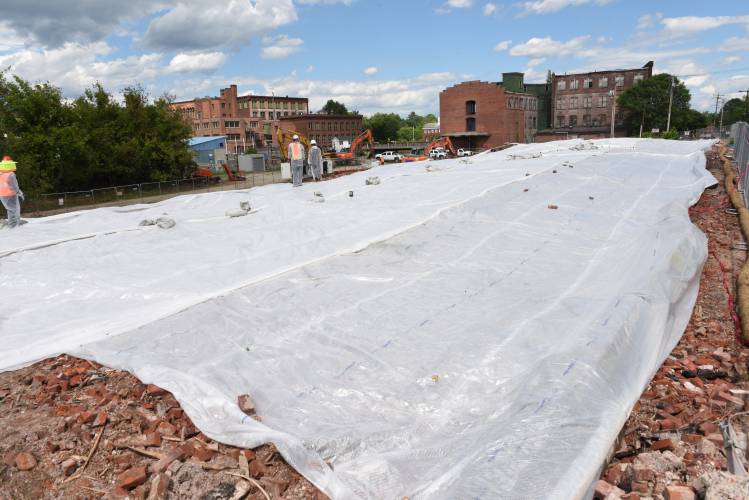
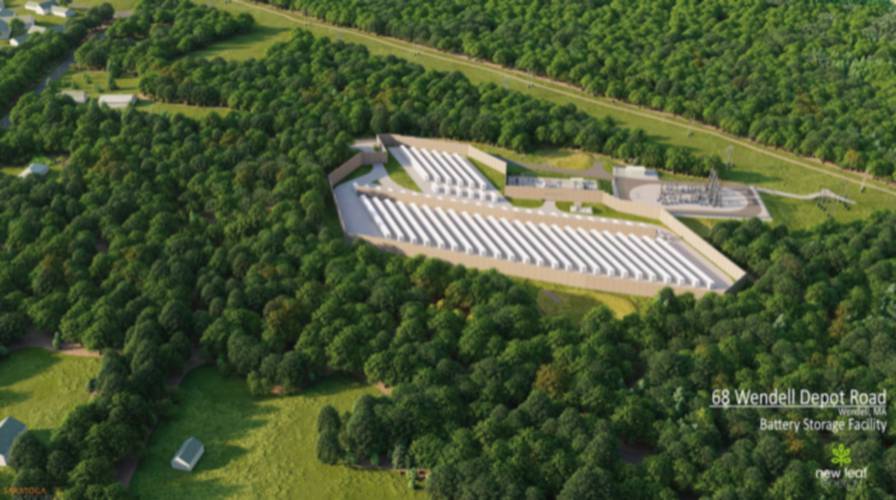
 No surprises in Wendell election
No surprises in Wendell election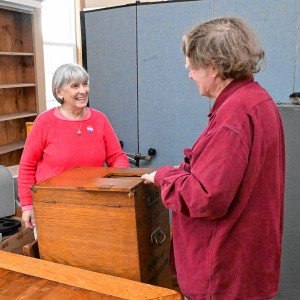 New Salem election ushers in new Selectboard member
New Salem election ushers in new Selectboard member
